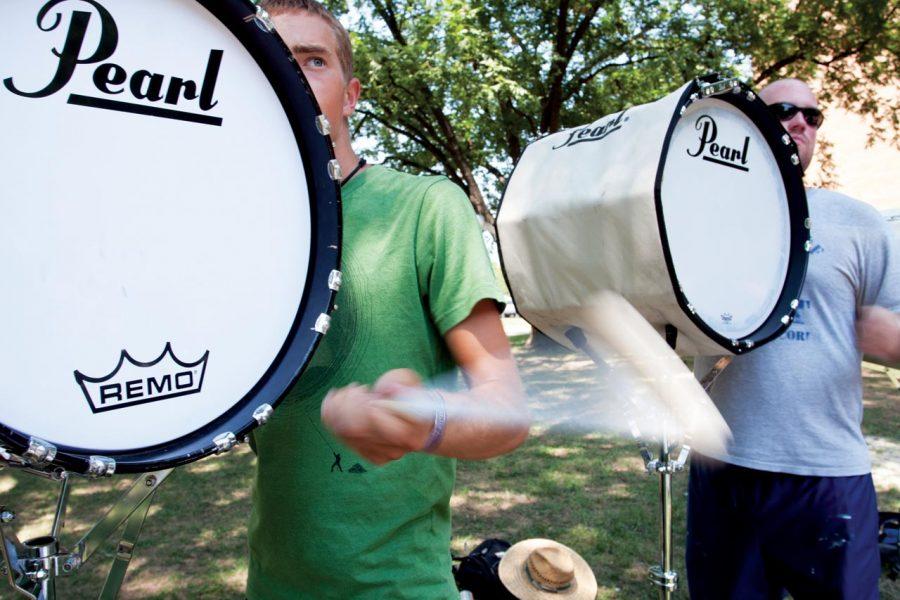Officials discuss distribution of service scholarships
April 5, 2012
Sweltering temperatures, grueling hours and a long season are often not as rewarding to some students who get a small amount of scholarship money for their work in band or athletics.
UNA cheerleader Caleb Canoles said the long hours and small scholarship amount he receives for his service have forced him to make the tough decision to leave the team to get an outside job to afford his bills.
“It is a lot of time, and, honestly, if I spent the same amount of time I put into cheering, I would have a lot more money if I had a job,” Canoles said.
Canoles receives a book scholarship that covers the cost of his textbooks and a $625 scholarship for his work as a cheerleader. He said it is understood by many that the scholarship amount is low, but that cheerleaders should receive more money than they get.
Canoles said cheering makes it hard for him and his teammates to obtain an outside job.
“I think I applied for 35 to 40 jobs and I never got a single call back because of (my availability) with cheering,” he said.
Assistant Athletics Director for Compliance Todd Vardaman said scholarship amounts vary by sport.
“Each coach is responsible for determining the award for their student athletes,” Vardaman said. “Each award is a yearly award; at the end of that year each coach will meet with their student athletes … at that time occasionally, (scholarships) are increased and decreased according to that coach.”
Vardaman said students can appeal the coach’s decision regarding their scholarship amount at the end of each year.
“Each sport is awarded (scholarship dollars) and we do it based on what we call equivalencies,” he said. “Each sport is different because of the number of awards they are allowed to receive.”
“Each sport has a certain number of equivalencies they are allowed and in each sport’s budget, they have a certain dollar amount they are allowed,” Vardaman said.
Each sport’s dollar amount is based off of rules the NCAA has in place, and the university’s budget as a whole, he said.
Members of the UNA Pride of Dixie band work during the summer, perform at every home football game and rehearse every week, said Band Director Lloyd Jones. “If they are going to go out there and do the work and perform at all the football games, we feel like we should give them something,” Jones said.
Jones said band members represent the university in many capacities, perform in competitions and get a large amount of exposure, he said. Jones said the band members deserve the money they get because of all the endless amounts of work they put in.
“While our team goes out there and performs in front of 4,000 people, we are actually performing in front of 12,000 people,” he said.
If there were not a scholarship program for the band, the university would not have a band, Jones said.
“The way they get a scholarship is simply through an audition score they get in the audition is based on an amount of money,” Jones said. “We are all humans; you can’t help and watch and determine who your valuable players are.”
Jones said his band members are awarded scholarship money based off whether they are talented players, involved members and many more qualities.
Although Jones wishes the band had more scholarship money, he said members of the band get approximately $300 to $3,500.
“What happens is tuition goes up every year and they’ll do a little 3 percent to 6 percent (raise in tuition), and after they do that, the burden is really on the students; they are spending your money,” Jones said.
Recently, the UNA Strategic Planning and Budget Study Committee approved a request to increase the band’s scholarship amount, which will bring the band a little bit closer to the scholarship percentage they received in 1990, Jones said.
Jones said he is looking at placing a cap on the number of members in the band in order to have more scholarship money to be more competitive with other universities.
“Money talks, and that’s really all it comes down to is money,” Jones said. “No matter where you go, college is expensive.”
Jones said in order to stay within the band’s scholarship budget, he had to take back $100 from each of the band members because of state proration. This was the first time the band had to take back scholarship dollars from students, he said.
“That’s not something you ever want to do, because you know (students) need that $100,” Jones said.
Although the band members understood, Jones said many students did not like the fact that they lost scholarship money but they know it is because the band is growing.
Band and athletic scholarships are not the only scholarships available on campus, said Scholarship Manager Shauna James in the student financial services office.
James said students could obtain scholarships for multiple positions on campus that include serving the campus.
Assistant Director of Student Engagement for Leadership and Volunteerism Jennifer Brown said her department offers a scholarship for students who want to serve the campus.
The contribution to campus life scholarships are offered to two students who want to serve in a leadership and service role.
“They help with service days, getting the word out about volunteer activities (and much more),” Brown said.
The two scholarships Brown offers are half-tuition scholarships, and she said the amount of scholarship is worth the work her students put in.
“If you want a half-tuition scholarship, you need to work for it,” she said.
Students should be thankful for the experience and the resume building instead of looking at the monetary aspect, she said.



![Caleb Crumpton [COURTESY OF UNA SGA]](https://theflorala.com/wp-content/uploads/2024/07/caleb-crumpton-courtesy-of-SGA-425x600.jpg)






